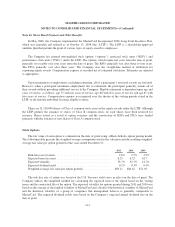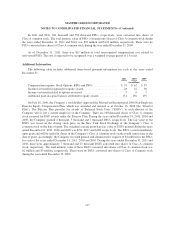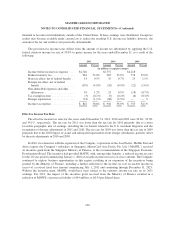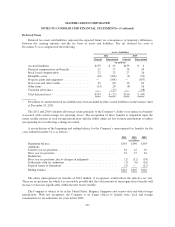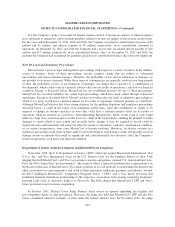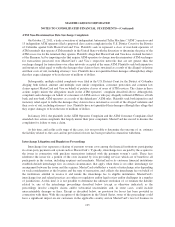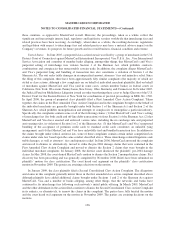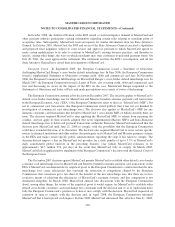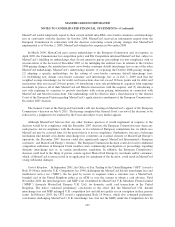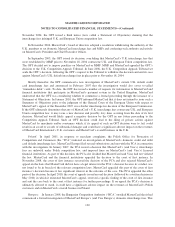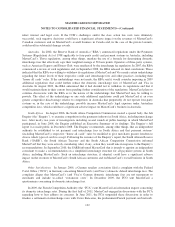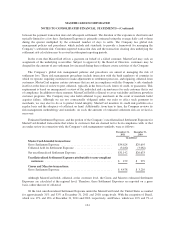MasterCard 2011 Annual Report Download - page 128
Download and view the complete annual report
Please find page 128 of the 2011 MasterCard annual report below. You can navigate through the pages in the report by either clicking on the pages listed below, or by using the keyword search tool below to find specific information within the annual report.MASTERCARD INCORPORATED
NOTES TO CONSOLIDATED FINANCIAL STATEMENTS—(Continued)
In July 2006, MasterCard and the other defendants in the MDL action entered into agreements settling the
MDL action and related matters, as well as the Schwartz matter. Pursuant to the settlement agreements,
MasterCard paid approximately $72 million to be used for the defendants’ settlement fund to settle the MDL
action and approximately $13 million to settle the Schwartz matter. In November 2009, Judge Pauley signed a
Final Judgment and Order of Dismissal granting final approval to the settlement agreements. A number of
appeals of the final settlement approval were filed. All the appeals of the approval have now been withdrawn and
the settlement is now final. With regard to other state court currency conversion actions, MasterCard has reached
agreements with the plaintiffs for a total of approximately $4 million, which has been accrued. Settlement
agreements have been executed with plaintiffs in the Ohio, Pennsylvania, Florida, Texas, Arkansas, Tennessee,
Arizona, New York, Minnesota, Illinois and Missouri actions. Now that all appeals of the final approval of the
MDL settlement action are extinguished, MasterCard and the plaintiffs in the state actions have or are in the
process of filing dismissals of the actions with prejudice.
U.S. Merchant and Consumer Litigations
Commencing in October 1996, several class action suits were brought by a number of U.S. merchants
against MasterCard International and Visa U.S.A., Inc. challenging certain aspects of the payment card industry
under U.S. federal antitrust law. Those suits were later consolidated in the U.S. District Court for the Eastern
District of New York. The plaintiffs claimed that MasterCard’s “Honor All Cards” rule (and a similar Visa rule),
which required merchants who accept MasterCard cards to accept for payment every validly presented
MasterCard card, constituted an illegal tying arrangement in violation of Section 1 of the Sherman Act. Plaintiffs
claimed that MasterCard and Visa unlawfully tied acceptance of debit cards to acceptance of credit cards. In June
2003, MasterCard International signed a settlement agreement to settle the claims brought by the plaintiffs in this
matter, which the Court approved in December 2003. In January 2005, the Second Circuit Court of Appeals
issued an order affirming the District Court’s approval of the settlement agreement thus making it final.
In addition, individual or multiple complaints have been brought in nineteen different states and the District
of Columbia alleging state unfair competition, consumer protection and common law claims against MasterCard
International (and Visa) on behalf of putative classes of consumers. The claims in these actions largely mirror the
allegations made in the U.S. merchant lawsuit and assert that merchants, faced with excessive merchant discount
fees, have passed these overcharges to consumers in the form of higher prices on goods and services sold.
MasterCard has been successful in dismissing cases in seventeen of the jurisdictions as courts have granted
MasterCard’s motions to dismiss for failure to state a claim or plaintiffs have voluntarily dismissed their
complaints. However, there are outstanding cases in New Mexico and California. In June 2010, the court issued
an order granting MasterCard’s motion to dismiss the complaint in the New Mexico action. The plaintiffs have
filed a notice of appeal of that decision and oral argument on the appeal was held in February 2012. With respect
to the California state actions, and as discussed above under “Department of Justice Antitrust Litigation and
Related Private Litigations,” in September 2009, the parties to the California state court actions executed a
settlement agreement which required a payment by MasterCard of $6 million, subject to approval by the
California state court. In August 2010, the court executed an order granting final approval of the settlement,
subsequent to which MasterCard made the payment required by the settlement agreement. The plaintiff from the
Attridge action described above under “Department of Justice Antitrust Litigation and Related Private
Litigations” and three other objectors filed appeals of the settlement approval order. In January 2012, the
Appellate Court reversed the trial court’s settlement approval and remanded the matter to the trial court for
further proceedings.
At this time, it is not possible to determine the outcome of, or, except as indicated above in the California
consumer action, estimate the liability related to, the remaining consumer cases and no provision for losses has
been provided in connection with them. The consumer class actions are not covered by the terms of the
settlement agreement in the U.S. merchant lawsuit.
124


